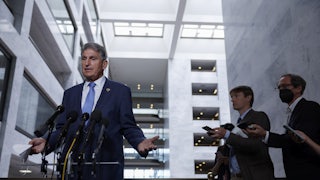The Inflation Reduction Act includes probably the only significant tax increases the Democrats will push through Congress during President Biden’s first, and perhaps only, four-year term. The bill’s likely passage is a political triumph for Biden, for which all Democrats should feel grateful. But why, oh why, must this be so difficult?
The bill’s limitations are a dispiriting reminder that the Democrats remain unwilling to tax corporations and the rich to anywhere near the extent this country did for most of the twentieth century—despite a strong public desire to do so and a nascent international agreement to impose a minimum corporate global income tax that the IRA would not fulfill.
The bill is misnamed, too, because it isn’t expected to do anything in the near term to curb inflation. If inflation remains a serious problem in 2025, when the Penn Wharton Budget Model says the bill’s anti-inflation effects will start to be felt, then our next president will probably be a Republican. The legislation’s principal virtue is what it would achieve on climate. Its provisions are projected within eight years to cut carbon emissions by 40 percent below 2005 levels. As a record-breaking heat wave sweeps the Midwest and Northeast, perhaps we should call it the Temperature Reduction Act.
The bill would spend $369 billion to address climate-change expenditure over the next nine years. Yet the legislation will actually reduce the budget deficit during the same period by $248 billion, according to the Penn Wharton analysis. (I’m using Penn Wharton because we don’t yet have an analysis by the Congressional Budget Office.) That’s consistent with Biden’s largely unheralded record of fiscal responsibility, which halved the budget deficit over the past year; under President Trump, the deficit quintupled. This difference is exaggerated by the timing of Covid relief, but over the past four decades, deficits have consistently fallen under Democratic presidents and risen under Republican ones. (See my May 3 piece, “No, Republicans Aren’t Better At Managing The Economy Than Democrats.”)
The big revenue raisers in the IRA are pricing reforms to Medicare’s prescription drug program ($266 billion savings over nine years, per Penn Wharton) and a 15 percent minimum tax on corporations’ book income ($260 billion savings over nine years). The pricing reforms consist largely in allowing Medicare to negotiate what it pays for high-priced drugs, just as any other large purchaser would do in the private market. To say these reforms are long overdue would be an understatement; Republicans (and a few bought-off Democrats) have blocked them since President George W. Bush expanded Medicare coverage to pharmaceuticals 19 years ago.
The 15 percent minimum tax has The Wall Street Journal’s editorial board’s knickers in a twist because nearly half of the revenue would be raised from manufacturers. But the tax would fall only on businesses that average more than $1 billion in profits over three years. That means the tax would affect only 150 of the nation’s very biggest corporations, and if those corporations are forced to pay at least 15 percent in taxes at a time when individuals earning $11,000 must pay a marginal tax of 12 percent on every additional dollar earned, then cry me a friggin’ river.
The 15 percent minimum tax is easy to confuse with the 15 percent global minimum tax, and when I first heard that Democratic Senator Joe Manchin of West Virginia had agreed to support it I rejoiced that the United States was on track to adopt the global minimum. That turned out to be wrong. Manchin still opposes the 15 percent global minimum, which would require corporations to increase the GILTI tax (short for “Global Intangible Low Tax Income”), on foreign earnings in excess of 10 percent, from a top rate of 13 percent to a uniform rate of 15 percent. As I’ve written before, the United States has much more to gain from the global minimum, which if adopted worldwide would eliminate offshore corporate tax havens, than almost any other country on earth. One hundred and thirty-six nations are ready to sign on the dotted line, including the Cayman Islands. But many will balk if the United States doesn’t enact the minimum, and it looks like it isn’t going to anytime soon.
Writing in The Washington Post, Catherine Rampell points out that rather than enact the 15 percent minimum book tax (again: not the same thing as the global minimum), it would make a lot more sense to raise the corporate income tax rate. That’s quite right. Trump dropped the top corporate rate five years ago from 35 percent to a single rate of 21 percent. Biden proposed raising it to 28 percent, which was too low; the economy was running fine in 2017, when the top rate was 35 percent. Manchin was willing to raise the corporate income tax only to 25 percent. But because Senator Kyrsten Sinema, Democrat of Arizona, was unwilling to increase the corporate tax rate at all, the IRA leaves it at Trump’s 21 percent. It’s important to remember that even before Trump lowered corporate taxes, they were very close to an all-time low. As a percentage of GDP, corporate taxes have been in more or less steady decline since the mid-1950s.
Another significant tax increase in the IRA is a lengthening of the holding period for carried interest from three years to five (estimated revenue: $13 billion). Carried interest is an accounting fiction that allows rich hedge fund and private equity partners to treat income, which ordinarily has a top marginal tax rate of 37 percent, as a capital gain, which has a tax rate of only 21 percent. The increase in the required holding period would apply only to people earning more than $400,000, but even so it would be a sufficient nuisance for financiers to wait five years to cash out that the change would largely eliminate use of the loophole. Like the IRA’s pricing reform for Medicare prescription drugs, killing the carried interest loophole is long overdue. Critics have been calling for its elimination for two decades. During his early days in the Senate, Chuck Schumer of New York defended the loophole on behalf of his Wall Street constituents, but he gave that up long ago. Now the obstacle is, once again, Sinema, who may demand that the carried interest provision be scaled back or removed from the bill. (She’s also shaky on the 15 percent minimum.)
I haven’t mentioned among the revenue-raisers the IRA’s proposed $80 billion increase in the Internal Revenue Service budget over the next decade. As I observed last year, underfunding the IRS loses the government the equivalent of half the Pentagon budget every year, and effectively turns the top 0.01 percent in the income distribution into a criminal class. The proposed increase in funding would yield a net revenue increase of $147 billion, according to Penn Wharton. This is a rare instance in which the old maxim is true that to make money you have to spend money. But as a ProPublica investigation four years ago demonstrated, the GOP has waged war on the IRS budget for more than a decade.
The tax changes included in the IRA are all necessary and valuable. But when you figure this may be as good as it will get during Biden’s presidency it’s hard not to feel disappointed. Don’t blame Biden. He has proposed raising the top marginal income-tax rate, which as recently as 1980 was 70 percent, from 37 percent to 39.6 percent; he’s proposed taxing capital gains at that same 39.6 percent for people earning in excess of $1 million (the top capital gains rate today is 23.8 percent); he’s proposed eliminating the “angel of death” loophole that allows capital gains to go untaxed when an investor dies; he’s proposed a “billionaire’s tax” on unrealized capital gains; and he’s proposed raising the estate tax to 40 percent for inheritances in excess of $11.7 million (up from a marginal tax that rises from 18 percent to 40 percent). Biden has taken a bolder stance in favor of taxing the wealthy than any president in at least half a century. But Congress won’t budge on these proposals. Barring a surprise turnaround for the Democrats in the midterms, none of them will become law before the next presidential election.
And maybe not even then, because it hasn’t been Republicans that shot down these various proposals, but Democrats. In a filibuster-free budget reconciliation bill you need “only” 51 votes to pass a tax increase. The Democrats have them, but they don’t have the will—and while, yes, the naysayer is usually Manchin or Sinema, others have balked at some of Biden’s bolder tax proposals too.
Democrats don’t reject major tax increases on the rich because they’re unpopular. Last September a Morning Consult poll showed that 68 percent of registered voters favored higher taxes on the rich and 62 percent favored higher taxes on corporations. A 59 percent majority of Republicans favored higher taxes on the rich and a 55 percent majority of Republicans favored higher taxes on corporations. Polls in Manchin’s West Virginia and Sinema’s Arizona show much the same.
So what’s the problem? Probably it lies somewhere in the general vicinity of the people who fund Democrats’ campaigns. Sinema, who sits on the Banking Committee, has accepted $2.2 million from the financial industry since 2017. Manchin took $1.7 million from the financial industry during the same period, and $875,000 from the oil and gas industry. If Democrats don’t watch out, Republicans might steal the tax-the-rich issue right out from under them like they did trade. I don’t expect that to happen, despite the GOP’s big talk about being the party of the working class. But it would serve Democrats right if they did!
There is no better time than when inflation is high to raise taxes. It’s one of the very few things Congress can do to curb it. The IRA is a worthy piece of legislation that will raise necessary revenue, reverse some past inequities, and finally point us in the right direction on climate. But it won’t do much about inflation, and it’s a missed opportunity to restore taxation to a decent level of progressivity.








